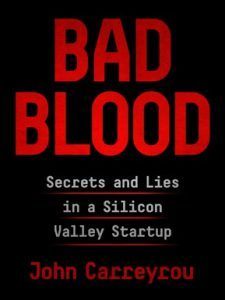John Carreyrou in Wired:
 ALAN BEAM WAS sitting in his office reviewing lab reports when Theranos CEO and founder Elizabeth Holmes poked her head in and asked him to follow her. She wanted to show him something. They stepped outside the lab into an area of open office space where other employees had gathered. At her signal, a technician pricked a volunteer’s finger, then applied a transparent plastic implement shaped like a miniature rocket to the blood oozing from it. This was the Theranos sample collection device. Its tip collected the blood and transferred it to two little engines at the rocket’s base. The engines weren’t really engines: They were nanotainers. To complete the transfer, you pushed the nanotainers into the belly of the plastic rocket like a plunger. The movement created a vacuum that sucked the blood into them. Or at least that was the idea. But in this instance, things didn’t go quite as planned. When the technician pushed the tiny twin tubes into the device, there was a loud pop and blood splattered everywhere. One of the nanotainers had just exploded. Holmes looked unfazed. “OK, let’s try that again,” she said calmly. Beam1 wasn’t sure what to make of the scene. He’d only been working at Theranos, the Silicon Valley company that promised to offer fast, cheap blood tests from a single drop of blood, for a few weeks and was still trying to get his bearings.
ALAN BEAM WAS sitting in his office reviewing lab reports when Theranos CEO and founder Elizabeth Holmes poked her head in and asked him to follow her. She wanted to show him something. They stepped outside the lab into an area of open office space where other employees had gathered. At her signal, a technician pricked a volunteer’s finger, then applied a transparent plastic implement shaped like a miniature rocket to the blood oozing from it. This was the Theranos sample collection device. Its tip collected the blood and transferred it to two little engines at the rocket’s base. The engines weren’t really engines: They were nanotainers. To complete the transfer, you pushed the nanotainers into the belly of the plastic rocket like a plunger. The movement created a vacuum that sucked the blood into them. Or at least that was the idea. But in this instance, things didn’t go quite as planned. When the technician pushed the tiny twin tubes into the device, there was a loud pop and blood splattered everywhere. One of the nanotainers had just exploded. Holmes looked unfazed. “OK, let’s try that again,” she said calmly. Beam1 wasn’t sure what to make of the scene. He’d only been working at Theranos, the Silicon Valley company that promised to offer fast, cheap blood tests from a single drop of blood, for a few weeks and was still trying to get his bearings.
He knew the nanotainer was part of the company’s proprietary blood-testing system, but he’d never seen one in action before. He hoped this was just a small mishap that didn’t portend bigger problems. The lanky pathologist’s circuitous route to Silicon Valley had started in South Africa, where he grew up. After majoring in English at the University of the Witwatersrand in Johannesburg (“Wits” to South Africans), he’d moved to the United States to take premed classes at Columbia University in New York City. The choice was guided by his conservative Jewish parents, who considered only a few professions acceptable for their son: law, business, and medicine.
More here.
